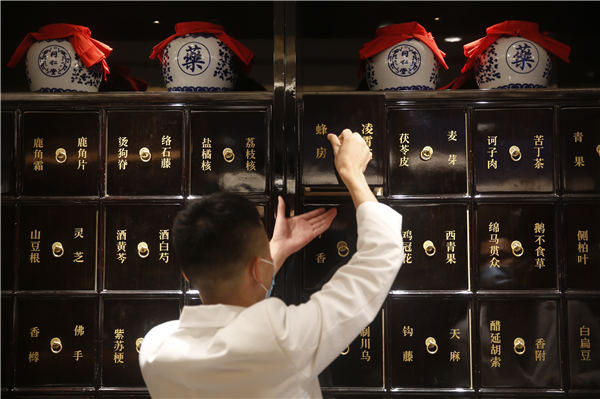 |
|
Unlike a conventional diet that runs a straight line emphasizing healthy eating and engaging in physical activity, the punk diet, championed by Generation Z, those born this century, bounces back and forth between extremes, its practitioners taking great delight not only in the irony but in the fact that they are leading an oh-so trendy lifestyle as well. [Photo provided to China Daily] |
A survey last year by the market consultancy iResearch found that among young people who stay up late at night nearly 42.6 percent usually go to sleep between 10 pm and 11 pm, and nearly 33.7 percent between 11 pm and 12 am. The rest, 23.7 percent, said they go to sleep after midnight and have long-term problems relating to irregular work and rest.
Seventy percent of the late sleepers said they could sleep seven hours a day, and nearly 8 percent said they suffered from severe sleep deprivation, with average sleep of five hours or less. In addition, a comparison of groups with different times for going to sleep found that the earlier the time, the higher the proportion of full sleep (seven hours or more), and the later the time of going to sleep, the greater the proportion of severe sleep deprivation (five hours or less).
"It has almost become routine among young office workers to binge drink coffee when they are busy at work," Jiang says. "They ponder the dark circles under their eyes, and an instant later you see them putting goji berries into the thermos flask they bought in Japan."
Jiang light-heartedly sums up the health regimen of contemporary young people: "They spend half their life skinny dipping and the other half magic potion sipping."
And healthcare companies, always with an eye to marketing opportunities, have spotted this phenomenon. Among them is Tong Ren Tang medicine store, 351 years young, in Beijing. It has created what it calls a "Chinese medicine coffee" that taps into demand and the very name of the new sounds like a health preservation.
That Tong Ren Tang should have decided to become involved in this young mark fits in well with the irony of the punk diet lifestyle, for when many people think of this company what would no doubt cross their minds would be pictures of the quaint old stores in which it plies its wares, the surroundings including carved wooden beams and paintings, old-fashioned containers full of medicine and almost invariably an ancient Chinese doctor with silver hair and white beard.
Tong Ren Tang, one of the most prestigious traditional medicine stores in China, was founded in 1669, the eighth year of the Kangxi Reign in the Qing Dynasty (1644-1911), and from 1723 was dedicated to imperial medicine, serving the needs of eight emperors over 188 years.
Goji berry latte, appetizing americano, mother-wort rose latte, diuretic anti-swelling osmanthus honey bean coffee are some of the oh-so-non-traditional drinks it sells.
"We soften the goji berry, squeeze it into a pulp and add it to the coffee," says Li Shengli, barista of Tong Ren Tang Coffee Shop. "What it does is nourish the liver and kidney. For those who often stay up late it's a good idea to drink wolfberry latte."
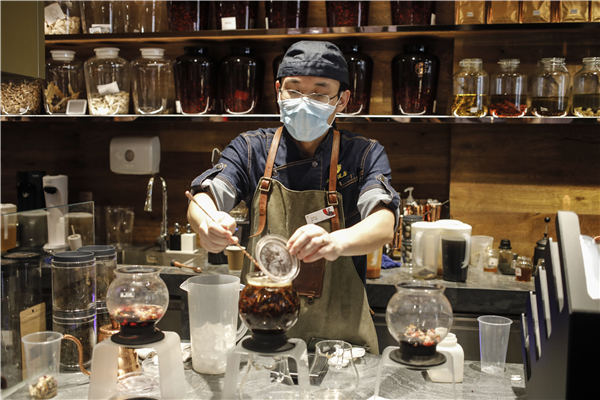 |
|
At Tong Ren Tang Zhima Health No 1 Store in Beijing, the first floor of the store offers packaged retail products such as health soup, congee and pastry bread. [Photo provided to China Daily] |
Li, a barista for many years, says that after to work for Tong Ren Tang this year, he realized that he could understand coffee from the perspective of Chinese medicine. The coffee itself that relieves pain is matched with Chinese herbs such as wolfberry, tangerine peel and cinnamon, high in potassium and antioxidants.
However, herbal coffee is just the tip of the iceberg of the company's stronger attention to young consumers. At Tong Ren Tang Zhima Health No 1 Store in Chaoyang district of Beijing, the first floor of the store also offers packaged retail products such as health soup, congee and pastry bread; on the second floor is the traditional drug store, where registration, consultation and medicine are available.
Su Xiaohang, in charge of brand promotion, says the herbal coffee is not the focus of the marketing, but it hopes to use coffee and fast-moving consumer goods to attract people to create a new environment that reflects healthy living.
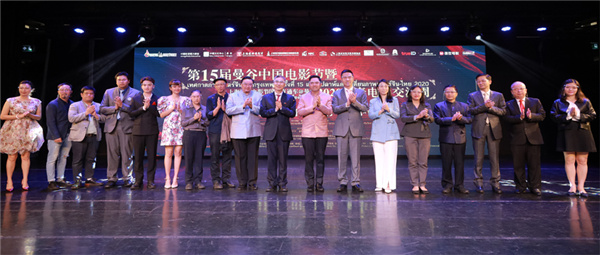 |
The 15th Chinese Film Festival in Bangkok and the 2020 China-Thailand Film Exchange Week opens at the China Cultural Center in Bangkok on Oct 25, 2020. [Photo provided to Chinaculture.org] |
On Oct 25, the opening ceremony of the 15th Chinese Film Festival in Bangkok and the 2020 China-Thailand Film Exchange Week was held at the China Cultural Center in Bangkok. The event was hosted by the China Cultural Center in Bangkok and received strong support from the Chinese Embassy in Thailand and the Thai Ministry of Culture.
The COVID-19 pandemic doesn't impede the enthusiasm for cultural exchange between China and Thailand. This film festival uses live broadcast to present the opening ceremony and host the "China-Thailand Film Exchange and Cooperation Online Seminar". During the film festival, audiences can use the online platform of the China Cultural Center in Bangkok to watch films online, which greatly increases the global reach of the festival.
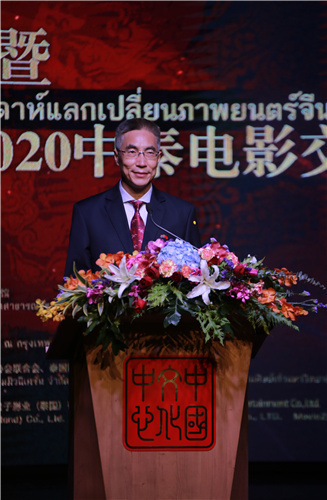 |
Gu Hongxing, director of the China Cultural Center in Bangkok and China Tourism Office in Bangkok, speaks at the opening ceremony. [Photo provided to Chinaculture.org] |
Gu Hongxing, director of Bangkok's China Cultural Center and China Tourism Office, said film can not only introduce one's national culture, but also reflect unique social landscapes. Film has become an important part of cultural exchange between countries and enhance mutual understanding among people around the world.
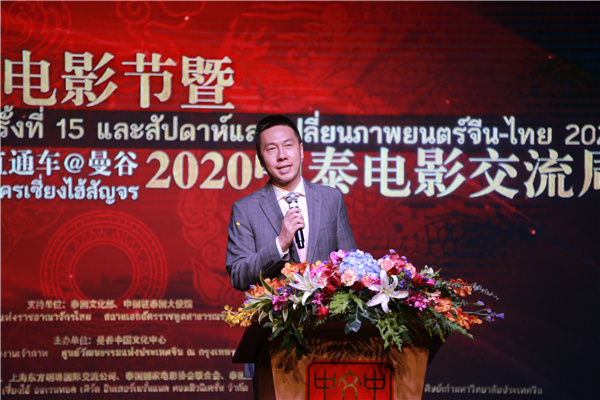 |
Yang Xin, Chargé d'affaires of the Chinese Embassy in Thailand, speaks at the opening ceremony. [Photo provided to Chinaculture.org] |
Yang Xin, Chargé d'affaires of the Chinese Embassy in Thailand, said since the establishment of diplomatic relations between China and Thailand 45 years ago, the mutual trust between the two countries has continued to deepen, economic and trade cooperation has expanded, cultural exchanges have become closer, and all-around cooperation has achieved fruitful results. Both China and Thailand have a vast film market. As a traditional project of cultural exchanges between China and Thailand, the Bangkok Chinese Film Festival has laid a solid foundation for film cooperation between the two countries for 15 years and will add new drive to the promotion of cultural exchanges and cooperation between China and Thailand.
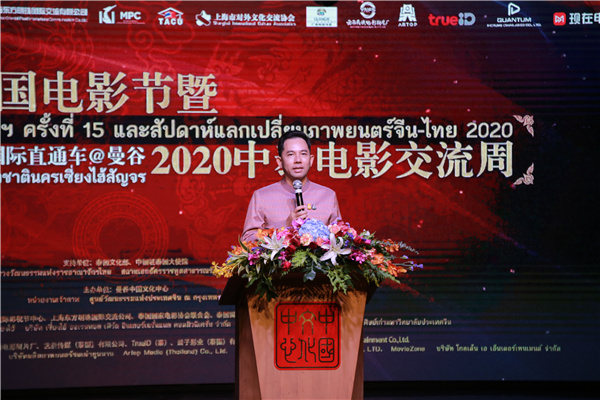 |
Itthiphol Kunplome, Thailand's minister of culture, speaks at the opening ceremony. [Photo provided to Chinaculture.org] |
Thailand's Minister of Culture Itthiphol Kunplome said in his speech the governments and people of Thailand and China have been in constant exchange. Cooperation in various fields has developed steadily, and the film festival is another important event to further promote cultural exchanges between the two countries. The people of the two countries can promote their understanding of the cultures of both sides through films, and promote friendly relations and cooperation in other perspectives.